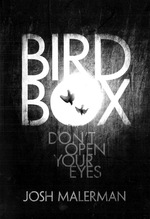 Ecco / May 2014
Ecco / May 2014
Reviewed by: Vince A. Liaguno
The idea that we have nothing to fear but fear itself – which Franklin D. Roosevelt famously paraphrased in his inaugural Presidential address, borrowing from the line "Nothing is terrible except fear itself" from an essay by Sir Francis Bacon – has been a subconscious thematic mainstay in horror fiction. First-time novelist Josh Malerman builds on this idea of terrors unseen and posits that the imagination may be the most powerful horror of all in his unsettling debut novel, Bird Box.
In a reverent wink to Lovecraft, the apocalypse arrives courtesy of an insanity pandemic that causes the world’s denizens to go stark raving mad and suicidal – a mass descent into personal madness caused by catching sight of something unfathomable that the human mind can neither comprehend nor process. To survive, society turns inward – physically and metaphorically – by retreating indoors, covering windows with blankets and never opening doors without blindfolds.
Bird Box opens masterfully with the introduction of Malorie – the novel’s protagonist – as she prepares for a rowboat trip under the protective cover of what she believes to be a thick fog blanketing the waterway she must traverse to some unknown, unconfirmed endpoint promising safety. The twenty-mile journey downriver – blindfolded – seems all but guaranteed death for her and the pair of unnamed four-year-olds she’s parent to at the novel’s outset.
Alternating between Malorie’s treacherous trip downriver are the events leading up to it – from learning of an unplanned pregnancy amidst the first reports of global calamity to her seeking refuge with a band of fellow survivors inside a suburban home and adapting to this new apocalyptic reality with her housemates. Malerman uses Malorie’s pregnancy as a countdown device to the events that unfold within the house and – in a mastery of subtle foreshadowing evident from the opening chapter – how Malorie comes to be alone with two children.
Even in these alternating chapters where the group dynamics of the reluctant refugees might feel familiar, Malerman successfully layers the more customary elements of the societal microcosm forced together by circumstance – leadership struggles, increasing paranoia, differences of opinion over which new arrivals to let in or not, collective concerns over dwindling food reserves, debates over strategies to better their situation – with fresh touches specific to his story (such as learning to travel outside the safety of their house and perform essential outdoor tasks while blindfolded).
Malerman keenly uses the sensory deprivation his characters must endure to heighten the reader’s own sensory experience. He makes the most of his character’s forced blindness, expertly using descriptions of sound and touch to turn a straightforward run to the water well or rowboat excursion into nerve-wracking sequences that make the reader’s blood run cold. This at times unbearable sensory delirium he subjects his characters to disorientate the reader enough to wonder whether it’s hysterical fear brought on by the power of suggestion or nameless monsters lurking within arm’s length that is the actual threat which will ultimately do the novel’s characters in.
Malorie is a near-perfect exercise in character development and execution. Malerman deftly draws her as a mother compelled into her role as a reluctant drill sergeant who relentlessly trains her children over the course of four years to hear with an almost preternatural acuity. In the hands of a lesser writer, Malorie could come off as a hopelessly bleak heroine, a harsh, emotionless parent hell-bent on teaching her children to confront the reality of an unknown “other” well beyond their developing minds’ comprehension without being able to see it. But Malerman nimbly balances the elements of cheerless inevitability that bears down on his protagonist and the flickering hope that powers her forward despite the seeming futility of her immediate situation and the bleakness of the larger dystopian world around her.
Bird Box reads like a master class in fear and suspense, easily belying its debut novel status and elevating it well beyond its novice pedigree. Malerman adroitly creates tension by stretching moments of terror into anticipatory swells – like a roller coaster that climbs and climbs interminably. He further ratchets up the reader’s overall feeling of unsteadiness by skillfully withholding information, preferring to keep almost every external threat to the characters – from the psyche-shattering creatures they imagine all around them to the actual cause of the mass psychosis that’s rendered the world a global ghost town – ever present but just out of focus enough to be abstract. Malerman uses his characters’ necessary sightlessness to create a literary blindfold that short-circuits the reader’s own processing mechanism that allows them to see through the author’s words. The more he withholds this sense of sight – which runs counter to the human instinct to look even when we’re told not to – he cleverly engages the reader’s own sense of imagination, creating a more experiential read.
Chilling and mercilessly paced, Bird Box is easily this year’s most notable speculative fiction debut. Imbued with an almost elegiac gloom throughout that tints its narrative palette gray, Bird Box drips with an ever-present sense of expectation and dread. Malerman immerses the reader into his dystopian world by blinding them alongside his characters, ultimately heightening the horror and leaving the reader desperate to open their eyes despite the potential consequences of doing so.
Purchase Bird Box by Josh Malerman.